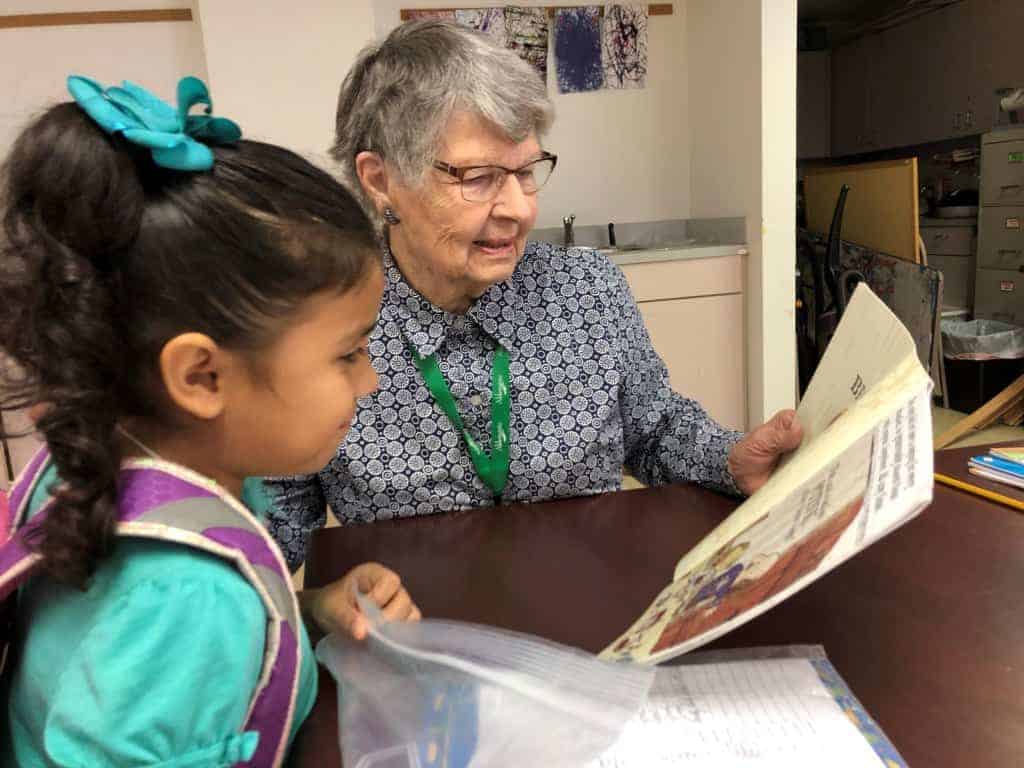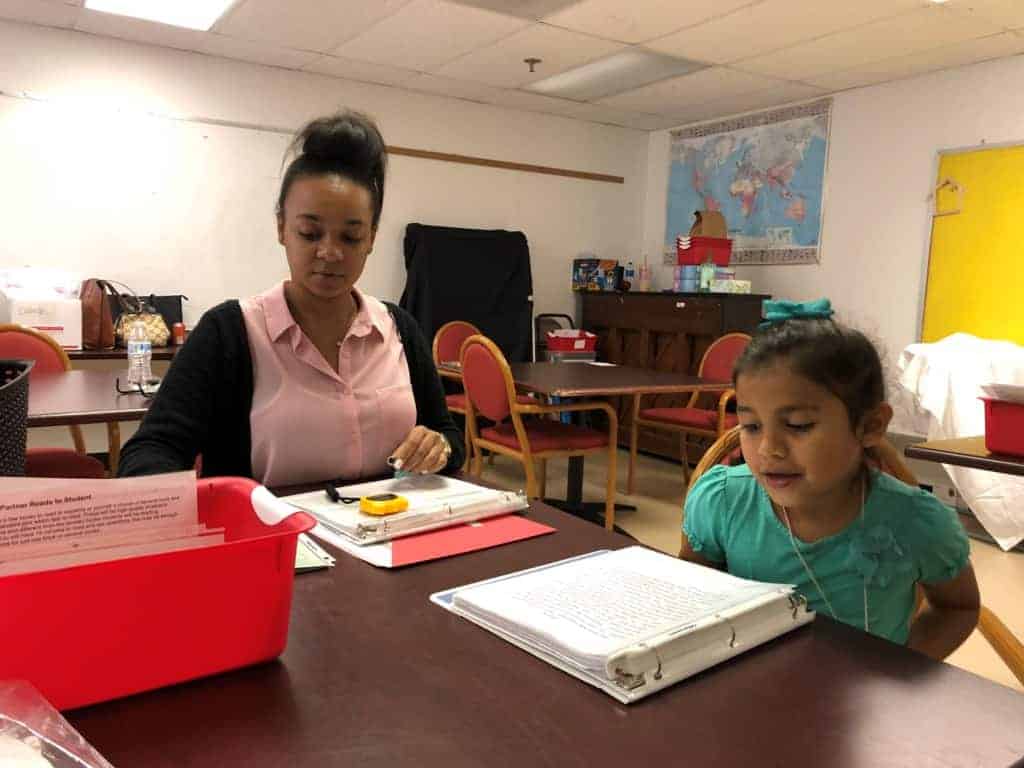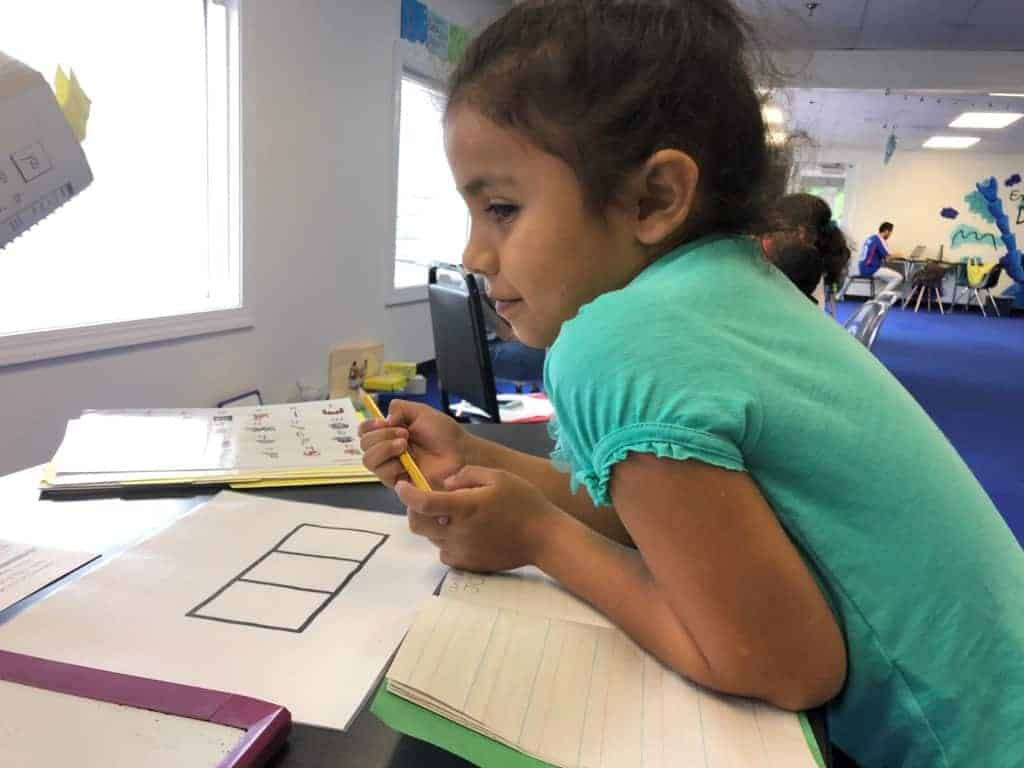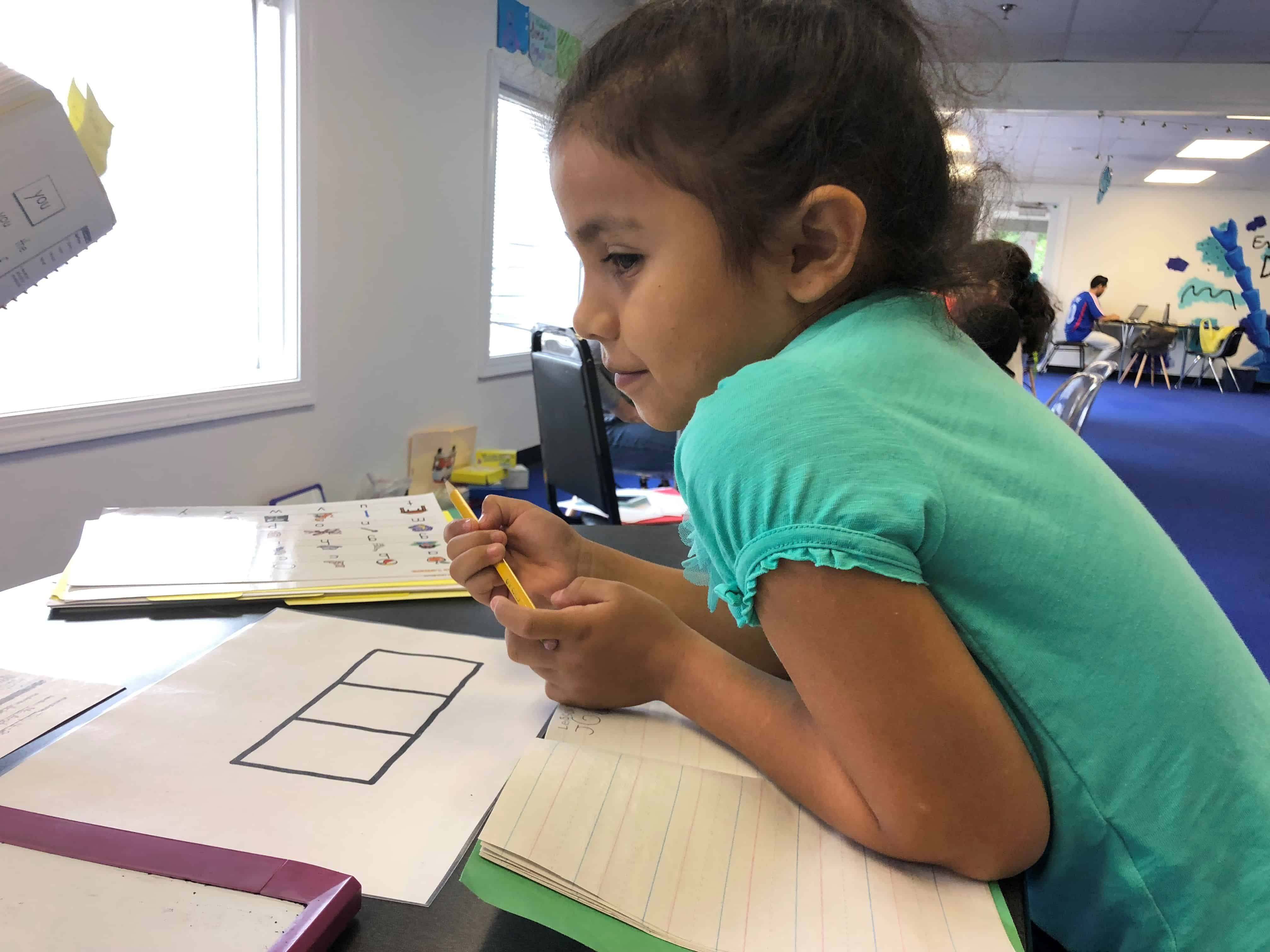Estrella, or “Star,” a small eight-year-old rising second-grader from Merry Oaks Elementary School in Charlotte had just finished breakfast at summer camp. At 9:00 am, she enters a classroom space wearing her backpack, a ponytail, and a giddy smile. She eagerly climbs onto a chair at a small table with bags of books on it. Betty, her Reading Partner, is waiting for her. Betty greets Star warmly,
“Good morning, Star! How are you?”
“Good,” says Star with a grin.
“What book would you like me to read today?” asks Betty. She hands her a plastic bag with several books in it, all selected with Star in mind. Star chooses a book titled, Sloppy Joe, by Dave Keane. Betty points to the title and asks, “Do you know what this says?”
Star squints at the words and sounds out, “Sl..op…”
“Sloppy!” says Betty. “Do you know what sloppy means?”
“Dirty?” Star asks.
Betty nods and says, “Messy.”
Betty reads the book aloud to Star, pointing to words as she reads. She invites Star’s comments, and asks questions of Star, such as, “Why do you suppose he did that?” Betty defines words as they read together and provides her own comments too, saying, “I am not sure I’d want to live with Sloppy Joe, would you?”
Their focus is on enjoying a book together, learning new words such as fence, fascination, and sloppy, and understanding the concepts in the book. This sort of lesson is called dialogic reading, and it has been shown in many studies to have a strong impact on listening comprehension and vocabulary development. In Charlotte, we call this activity “Active Reading.”

Star and 59 other rising first- and second-graders are attending five weeks of summer camp that includes swimming, sports, crafts, games, songs, special events, and lots of reading. In fact, these lucky children receive two hours of intensive reading interventions to avoid the summer learning loss and build reading skills that will take them into their fall school year. All children were nominated by their teachers for this opportunity because the camp is designed for children behind in reading.
I followed Star for a good part of her day on Monday, July 16, to see what the she and her camp mates experience as part of UNC Charlotte’s summer reading camp. After a breakfast for all 60 kids, Star’s day began with Active Reading with Betty, her Reading Partner. Betty is one of 21 residents of Aldersgate, a Charlotte Retirement Community center with a mission for community engagement. The residents have been trained in Read Charlotte’s Active Reading procedure and volunteer to work with the children 1:1 each morning or afternoon.
Thirty children begin their day like Star, with reading interventions, and then spend their day with camp counselors from the Charlotte Jewish Community Center (JCC). Thirty other children start the day with JCC camp, and get the reading support in the afternoon. The JCC’s trained staff allows the children time for play, structured activities such as sports and crafts, and even provides swimming lessons. The JCC is also committed to community development and has provided the staff to for camp on Aldersgate’s beautiful, sprawling campus.
Daniela Becker, the director of this JCC initiative, said, “I want to give these kids as many life experiences as we can pack into five weeks.” She has arranged for visits from a magician, Darby Acres Farm, a video game truck, and Charlotte’s Discovery Place science museum. Staff from JCC have also come out to hold a soccer clinic and teach flag football. Ice cream is delivered every Friday. On the day I spent observing Star, the children made Chia Pets.
After reading Sloppy Joe to Star, Betty says, “Now it is your turn to read.”
She nods at the bag of books, “Pick one of yours.”
She indicates to Star to choose one of the small Scholastic books in her bag. Star chooses one called Traffic Colors. Betty helps Star sound out the word traffic. Star remembers the book and proceeds to read it aloud, slowly but correctly, “Now…you…can…go.”
“Good,” says Betty. “The traffic light is red. Which car must stop?”
It is slow and laborious reading at first, but Star is almost errorless in her reading. She sounds more and more fluent as she reads. She stops and comments on the book, saying, “Wow! Looks at this car!” She is focused both on decoding the words and on the meaning of the story.
After several minutes of practice, Betty chooses another book to read aloud and discuss with Star. This is a book called John, Paul, George, and Ben by Lane Smith. She and Star enjoy the pictures, vocabulary, and meaning of the story. “George” in the book is George Washington, and Betty explains to Star who he was. Following this reading, Star choose another book from her stack to read aloud, a book just at her reading level.
At 9:45, a UNC Charlotte student, Darnisha, arrives at their table, giving Betty a break. Darnisha’s job is to work with Star on reading fluency. Darnisha begins by giving Star directions to read a passage aloud as best she can. If she comes to a word she does not know, Darnisha will provide it. Darnisha will time her and see how many words Star can read in one minute. After Star reads the passage, Darnisha asks her, “Tell me about what you just read.”

Then they read the passage again. This time, Darnisha does the reading while Star follows, pointing to each word read. Darnisha stops after every six or seven words and has Star read the next word. They move through the text like that. Finally, they read the passage a third time. Star reads it, and Darnisha times her again. She had missed the word “yesterday” in first reading, but got it this time.
In this third reading, Darnisha leads Star back to any word she missed, and has her read that word and all the words around it, a phrase or sentence, repeatedly, until Star sounds fluent with that phrase. Finally, Darnisha has Star read the passage one last time and she times her: “The first time you read this passage you made seven errors, and you read 33 words correctly. The last time you read this passage, you had two errors and you read 55 words correctly. Way to go!”
This was a HELPS reading intervention lesson. HELPS was developed at NC State by John Begeny and his colleagues, and it has been proven in multiple studies to be effective for helping students develop fluency.
A few minutes remain before Star moves to another classroom. Darnisha has time to read two more books to Star, and she chooses Silly Sally by Audrey Wood, and not surprisingly, another round Sloppy Joe. Like most kids, Star likes to hear some of her favorites again and again.
In this room and the one next door, there were 15 Reading Partner and Child pairings, creating a warm hum of reading, decoding, talking, and laughing. There is warmth and love felt in this room. Yet, the children were receiving a lot of support. In one hour, Star had four books read aloud to her. She practiced reading two books on her instructional level, with support on decoding, vocabulary, and comprehension. And she had a lesson on fluency.
And that was only the first hour.
At 10:00, it was time to move to a large open space across the hall, outfitted with 10 small triangle tables designed for a teacher to work with two students. Star heads straight to Brittany’s table, her teacher for this second hour. Brittany is a teacher at Windsor Park Elementary School during the year and enjoys this summer work with children in neighboring schools. She is ready for Star, and begins with drills on letter sounds. From there, they work on phonemic awareness activities, or “breaking words into three parts,” with the help of a simple visual cue.

Then Brittany has Star read a series of words by first sounding the word, then reading it fast, so it sounds like, “/j-o-g/ jog! These are drills and Star is expected to move quickly, but every error is corrected. No sloppiness allowed when learning phonics. If Star sounds out the word slowly, Brittany has her repeat the sounding and saying of this word a few times before moving on. The final drill before reading comes when Brittany reads a word and Star writes by hearing the sounds and spelling through sounds. All words are phonetically regular in this lesson (e.g. pad, did, pit). The atmosphere is friendly and warm, but rigorous.
This is a scripted program called Sound Partners, an evidence-based reading program designed to help children get better at phonics and beginning reading. It is exactly what Star needs and what has enabled her to read the small books and passages she read in her 9:00 am session.
A typical Sound Partners lesson has many components packed into a one-hour session, including the heavy focus on synthetic phonics taught in a sequential manner that builds on previously learned skills. It also includes reading books at “just right” levels with the phonetic patterns just learned in the lessons, sentence writing, which helps with decoding and word recognition, and spelling.
After two hours of intensive reading support, Star and her camp friends enjoy a delicious meal offered by Aldersgate Retirement Community, and she moves through the remaining of her day with the JCC staff who provide a rich set of camp experiences.
The UNC Charlotte summer reading camp is in its third year, and we believe it will prove to be a model for summer programs everywhere. Why? A study conducted by the lead researcher of the project, UNC Charlotte assistant professor Kristen Beach, illustrated that Sound Partners alone helped most of the children avoid summer learning loss and many to go being that.
The second year of summer camp, we trained the Aldersgate elders, our Reading Partners, in dialogic reading, another evidence-based practice. The results were even better. With over 60 children served in our second year, more lives were impacted as well. Importantly, though, we know that families need summer programs that operate all day, not just two hours a day. Summer camp led y experts such as those at the Jewish Community Center in Charlotte is what makes this program inviting and a model that can and should be provided to all children who need it.
Finally, this year we added the HELPS fluency intervention. We purposely selected an intervention with proven results. These three components (phonics, fluency, and comprehension) form a comprehensive, evidence-based program for struggling readers in the primary grades. Two UNC Charlotte faculty members, Jean Vintinner and Bill Anderson, organize the program with the help of David Flores, a teacher from Windsor Park Elementary School.
It takes a village to put on the program that provides exactly what learners need. Our support from the JCC, Aldersgate, and cash support from the ReEmprise Foundation, the Winer Family Foundation, and Sally Robinson of Charlotte, mean the program can operate with the needs and interests of the children in mind.
All children deserve this sort of rich, rigorous program, and we are pleased to get to provide it for 60 lucky Charlotte children.
Recommended reading




